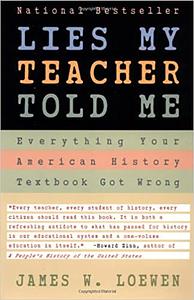Take a photo of a barcode or cover
1.01k reviews for:
Lies My Teacher Told Me: Everything Your American History Textbook Got Wrong
James W. Loewen
1.01k reviews for:
Lies My Teacher Told Me: Everything Your American History Textbook Got Wrong
James W. Loewen
History as told by textbooks and the media is a propaganda machine that minimizes the role citizen activism has had in significant changes in U.S. policy, such as the Civil Rights Act and the creation of the EPA.
Loewen examines several high school history textbooks, exposing everything from factually incorrect narratives about Christopher Columbus and the founding of the U.S. to the dearth of information about the U.S. role in overthrowing democratic governments around the world. Post-secondary school, many of us have been exposed to these unsanctioned histories.
But it’s not just that textbooks get it wrong by not giving us all the facts.
The problem is that none of us are entirely impervious to the subtle brainwashing that takes place when the message of history whitewashes our government, turning it into an occasionally misguided but ultimately beneficent power. The distorted view we are fed of the past disempowers us. The truths that Loewen presents have layers of implications for how we think about democracy and our role in it.
Loewen examines several high school history textbooks, exposing everything from factually incorrect narratives about Christopher Columbus and the founding of the U.S. to the dearth of information about the U.S. role in overthrowing democratic governments around the world. Post-secondary school, many of us have been exposed to these unsanctioned histories.
But it’s not just that textbooks get it wrong by not giving us all the facts.
The problem is that none of us are entirely impervious to the subtle brainwashing that takes place when the message of history whitewashes our government, turning it into an occasionally misguided but ultimately beneficent power. The distorted view we are fed of the past disempowers us. The truths that Loewen presents have layers of implications for how we think about democracy and our role in it.
I initially held off from reading this, since I thought it'd be too similar to Zinn's Peoples' History of the United States, but I was wrong. This takes a different in approach in analyzing the most effective way to teach students about American history and why it should not be taught from the viewpoint that American has done nothing wrong. It goes into much greater detail on the impacts early American colonists have had on Native Americans, which was pretty neat to hear.
informative
medium-paced
challenging
informative
inspiring
reflective
sad
tense
slow-paced
Let me preface my review by saying that I absolutely, wholeheartedly agree with Loewen's message. There is no subject—with the possible exception of mathematics—that is as badly taught as history in high school. Even worse, this is not an issue exclusive to the USA. As a person who went to a Quebecois (French Canadian) high school, I can attest that similar issues are common here.
Now, on to the review.
Lies My Teacher Told Me is an ambitious book that attempts to analyze some of the most often repeated lies and misleading statements in American history textbooks with the intention of dismantling them. The ultimate goal is to look at historiography from a critical perspective which is what the author believes is the goal of studying history in the first place. What a noble cause! In fact, I believe and agree with everything I wrote here. So why did I give the book a relatively low rating if I agreed with its message? For two reasons: the first being misinformation and the second being a lack of focus.
Let us start with misinformation. In some chapter—mostly the earlier ones—the author makes some claims that contradict the popular narrative of history as taught in USA high schools. For example, Loewen talks about how schools teach that Columbus "discovered" America. As all educated people know, this isn't the case since people already lived there. It is not even true that his voyages constituted the discovery of the American continent by Europeans as Vinland pre-dates Columbus' journey by nearly half a millenium. This is all factual. What irks me is the author's insistence on promoting alternative history with no evidence behind it. For example, the author mentions a story of how Native Americans "discovered" Europe before the Europeans "discovered" America. The story goes that two Native Americans were shipwrecked in 60 BC in what is now Holland. Sadly, I could not find any evidence for this story being true, which was disappointing since I thought it would have been an ironic twist on the popular narrative. The author also promotes disproven hypotheses of African pre-columbian contact. This was also disappointing as I don't see a reason why the author needs to undermine his point by promoting dubious theories. With two major errors in the beginning chapter alone, it is difficult to read the rest of the book without a ton of skepticism. I guess this could have been the author's intent but it comes at the cost of his credibility.
The other major issue I have with this book is its lack of focus. At multiple points, the author says that he intends his book not to be an exercise in textbook criticism but rather as a tool that can help people see how history differs from what is commonly taught in schools. But then, the author also ends up spending most of the book debunking myths. There is nothing wrong with doing this debunking and it does help show his point more clearly. But at the same time, this book could have focused more on the methodology of debunking said myths. I cannot fault the book too much for this because it does still need to target an audience that may have never heard of its criticisms of textbooks. However, I do believe that in the age of the internet, this book needs an update as fake news and misinformation rises to take over our minds.
In conclusion, I did enjoy reading this book but there are a couple of issues that I have with this book that affect its pacing and credibility which prevent me from giving it a higher rating. 3/5
Now, on to the review.
Lies My Teacher Told Me is an ambitious book that attempts to analyze some of the most often repeated lies and misleading statements in American history textbooks with the intention of dismantling them. The ultimate goal is to look at historiography from a critical perspective which is what the author believes is the goal of studying history in the first place. What a noble cause! In fact, I believe and agree with everything I wrote here. So why did I give the book a relatively low rating if I agreed with its message? For two reasons: the first being misinformation and the second being a lack of focus.
Let us start with misinformation. In some chapter—mostly the earlier ones—the author makes some claims that contradict the popular narrative of history as taught in USA high schools. For example, Loewen talks about how schools teach that Columbus "discovered" America. As all educated people know, this isn't the case since people already lived there. It is not even true that his voyages constituted the discovery of the American continent by Europeans as Vinland pre-dates Columbus' journey by nearly half a millenium. This is all factual. What irks me is the author's insistence on promoting alternative history with no evidence behind it. For example, the author mentions a story of how Native Americans "discovered" Europe before the Europeans "discovered" America. The story goes that two Native Americans were shipwrecked in 60 BC in what is now Holland. Sadly, I could not find any evidence for this story being true, which was disappointing since I thought it would have been an ironic twist on the popular narrative. The author also promotes disproven hypotheses of African pre-columbian contact. This was also disappointing as I don't see a reason why the author needs to undermine his point by promoting dubious theories. With two major errors in the beginning chapter alone, it is difficult to read the rest of the book without a ton of skepticism. I guess this could have been the author's intent but it comes at the cost of his credibility.
The other major issue I have with this book is its lack of focus. At multiple points, the author says that he intends his book not to be an exercise in textbook criticism but rather as a tool that can help people see how history differs from what is commonly taught in schools. But then, the author also ends up spending most of the book debunking myths. There is nothing wrong with doing this debunking and it does help show his point more clearly. But at the same time, this book could have focused more on the methodology of debunking said myths. I cannot fault the book too much for this because it does still need to target an audience that may have never heard of its criticisms of textbooks. However, I do believe that in the age of the internet, this book needs an update as fake news and misinformation rises to take over our minds.
In conclusion, I did enjoy reading this book but there are a couple of issues that I have with this book that affect its pacing and credibility which prevent me from giving it a higher rating. 3/5
dark
informative
reflective
slow-paced
challenging
informative
reflective
slow-paced
challenging
informative
reflective
informative
reflective
medium-paced
informative




